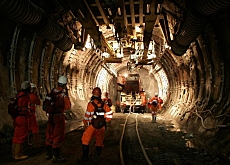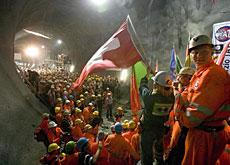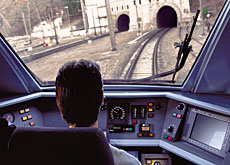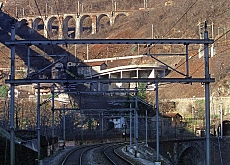Mounting tunnel costs cause controversy

Concerns have been raised over the spiralling costs of Switzerland's major new rail links through the Alps – for which new tunnels are being constructed.
The scheme, which aims to transfer transalpine freight traffic from road to rail, has been dogged by rising prices, geological problems, political interference and a legal wrangle.
The New Rail Links through the Alps (NRLA) project involves the construction of two main tunnels – the Gotthard in central Switzerland and the Lötschberg in the western part of the country. The Lötschberg is due to be opened at the end of next year.
In 1999 parliament approved a budget of SFr12.6 billion ($9.9 billion), but this has since increased several times.
The latest figures, released by the Federal Transport Office in September, have put the final costs at almost SFr18 billion.
The office’s director, Max Friedli, has been quoted as saying that the final bill could even be as high as SFr24 billion, taking into account rising prices, value added tax and interest on construction loans.
However, supporters of the project have rebuffed suggestions that the budget is getting out of hand.
“You have to take into account the fact that the first estimate was drawn up on a basis of cost of money, construction prices… that were valid for 1997,” said Matthias Neuenschwander, an engineer at Lombardi, a company involved in the project.
“The current projections, around SFr24 billion, concern the cost of the final work, that is until 2019-2020, after the base tunnels at Gotthard and Ceneri [part of the Gotthard line] are in operation.”
Geology
Geology has also caused some unforeseen problems in the Gotthard, which is set to become the longest rail tunnel in the world at 57 km.
The station at Faido had to be moved southwards due to a rock fault and at Bodio deformations appeared in the tunnel walls due to rock pressure. Bodio has since been enlarged.
This has cost both time and money and experts say other geological problems cannot be ruled out.
Political manouevres have also played their part. “It was parliament which asked for the change to [two tubes instead of one in] the Ceneri tunnel which placed a huge burden on the finances,” said Fabio Abate, a member of the parliamentary delegation overseeing the NRLA.
Added to this have been other parliamentary decisions on technical changes to the water system and improvements to tunnel security.
And a final decision has yet to be taken on the Porta Alpina project – a revolutionary deep underground station in the Gotthard.
Legal woes
An ongoing legal wrangle over the allocation of contracts for work on a part of the Gotthard has also contributed to the NRLA’s woes.
Work at the Erstfeld site has therefore been blocked for almost a year at an estimated loss of almost SFr100,000 a day.
Swiss firm Marti has mounted two successful legal challenges after the work was awarded to Swiss-Austrian consortium Murer-Strabag. Marti has claimed the bidding process was unfair.
In September Transport Minister Moritz Leuenberger offered to act as a mediator in the dispute and talks have since been held.
The deadlock has been criticised by some parliamentarians, with Leuenberger being accused of not having proper control over the dossier. And strong concerns have continued to be expressed over the rising budget.
“Nervousness is also increasing because next year parliament will debate a government proposal which considers several regional projects that would later need financing,” said Abate.
One such example is the Cornavin-Annemasse line in the French-speaking part of the country. Abate said that the money would come from the same source as for the NRLA, meaning the more money that is spent on the new rail link, the less there will be for other proposals.
“There is a tendency to put the NRLA in conflict with other regional wishes which are being mooted in the rest of the country,” Abate commented.
swissinfo
The New Railway Links through the Alps project, approved by the Swiss population in 1998, is made up of three parts:
Gotthard axis: the 57 km-long Gotthard tunnel is being built between Erstfeld, canton Uri and Bodio, canton Ticino. Construction began in 1999 and is expected to continue until 2015.
Lötschberg-Simplon axis: the 34.6 km-long Lötschberg tunnel is being built between Frutigen, canton Bern and Raron, canton Valais. Construction began in 1999 and the tunnel should open at the end of 2007.
Integration of eastern Switzerland into the NRLA: an upgrade of the line between St. Gallen and Arth-Goldau in canton Schwyz is being carried out.

In compliance with the JTI standards
More: SWI swissinfo.ch certified by the Journalism Trust Initiative



You can find an overview of ongoing debates with our journalists here. Please join us!
If you want to start a conversation about a topic raised in this article or want to report factual errors, email us at english@swissinfo.ch.